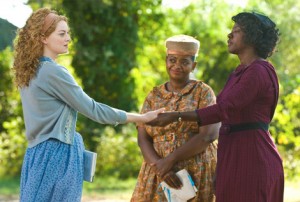
It’s the 1960s in Mississippi. A journalist decides to write about and expose the reality of persistent inequality in our country. What results is a touching story about friendship prevailing in a turbulent time.
Tate Taylor’s summer film “The Help,” originally a book written by Kathryn Stockett, focuses on the lives of three women in Mississippi in 1962. The main character, Skeeter, is a white, college-educated young woman aspiring to be a journalist. Skeeter is planning to write about the African American help of white families living in Jackson, Mississippi.
The filmmakers recreate a genuine image of the South, with women’s beehive hair-dos, news of President Kennedy’s death flashing in black-and-white on the TV and Ray Charles occasionally playing in the background.
The cinematographers did not really go above and beyond when it came to making the visuals a work of art. The lighting, the saturation, and the shots were all so generic that they were barely noticeable.
Hilly (Bryce Dallas Howard), the antagonist, a pretty, white, traditional ’50s housewife wearing a skirt wider than a hoola hoop attempts to slander the name of Minny, her ex-maid. What happens to Minny is what really drives her to get revenge and help with the book Skeeter’s writing.
From there, the stories snowball to an avalanche of maids wanting to share their stories- their struggles to make ends meet and support their large families, their abusive husbands, and, the worst of all, not having enough control over their own lives to be able to doing anything about it.
Aibileen (Viola Davis) is the first maid Skeeter talks to clandestinely. Aiblieen is a reserved, quiet woman who knows her place in the household—but that doesn’t stop the love in her heart, which shows through as she tells Skeeter about all the white babies she’s raised.
When she’s alone with the child that she currently looks after, she repeats to her “you is kind, you is smart, you is important.”
Despite the film having a few leading ladies, Viola Davis was the star. She is the most moving in her subtlety of expression. You can’t see her emotion broiling underneath the surface, but you can certainly feel it. She fragilely creates and becomes Aibileen.
Because I was so engrossed in the story, it didn’t feel like something to watch on the History Channel when there is nothing else on.
It felt real. Which, after all, should be a movie’s job. And “The Help” did a darn good one.





Cherry Gilb • Sep 15, 2011 at 2:35 pm
You’re not black, are you? Most of the black community is up in arms because of how *in*accurate this movie is.